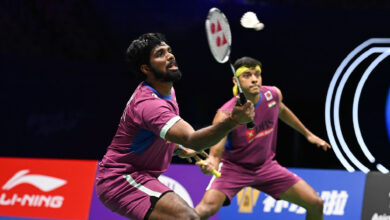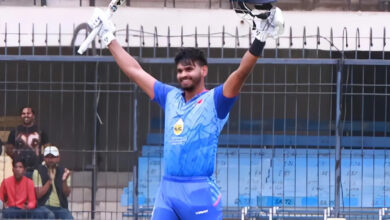Yashasvi Jaiswal’s success a hat-tip to Mumbai, city with big heart and giving cricketers | Cricket News

Here’s a request. While applauding India’s bright new star Yashasvi Jaiswal’s runs and his technical correctness, do give a hat-tip to his city Mumbai that has dutifully conserved its cricketing heritage like a precious family heirloom. Cricket’s original Indian home hasn’t allowed the wild winds of change to uproot the foundation of the game. Had it not been for Mumbai, Yashasvi wouldn’t have happened.His is a barely believable true story. As an 11-year-old son of a small-time shopkeeper in Bhadohi in UP, he had travelled all alone to the city that Bollywood keeps telling the world fulfils every dream. Yashavi wanted to play for India, he was driven and focused. He eventually did. There was help from coaches, mentors and guardians but if one zooms out, a more heartening bigger picture emerges.
Yashasvi, the outsider with raw talent, was adopted a system that still works on meritocracy. Unlike the erstwhile cricketing heavyweight Delhi, Mumbai still cares for its cricket and young cricketers. Had the young Yashasvi undertaken the shorter trip from home and reached Delhi, chances are the 22-year-old would have been still dragging his kit-bag to Kotla for some u-23 trials.
Over the years, like everything, the maidaans have been commercialised over, but they are still inhabited those anonymous benefactors, former players who love talking cricket, unsung coaches and unbiased selectors who take pride in grooming the next generation of cricketers. Passing the baton is not an obligation, nor a transaction, for many it remains a responsibility. This has ensured that pictures of batting prodigies with their whites soiled the maidaan red clay still make it to the front pages of Mumbai papers.
India’s Yashasvi Jaiswal celebeates scoring 200 runs during the 4th day of the 3rd cricket Test match between India and England, at Niranjan Shah Stadium, in Rajkot, Sunday, Feb. 18, 2024. (PTI Photo)
The one-time nursery of Indian batting, the most successful first-class side has an abundance of expertise. In his book Sunny Days, Gavaskar talks about a visitor who had come to his home to deliver a wedding invite but ended up giving him a batting tip that stayed with him all through his career.
“One day when I was leaving home to play a match, my father stopped to introduce me to Mr Kamal Bhandarkar, a former Maharashtra player who is always prepared to coach … He had come to invite us for a wedding.. He asked me to show him my forward defence. When I did so, Mr Bhandarkar pointed out that my bat was at an angle and there was the danger of the ball being deflected towards the slips,” writes Gavaskar. Mr Bhandarkar, he goes on to add, was the kind who was prepared to sit “all night to discuss cricketing problems one might have”.
For someone like Yashasvi, the dedicated coaches like Mr Bhandarkars were crucial to his growth. Unlike Gavaskar, Yashavi didn’t have a Test cricketer uncle like Madhav Mantri, whose India cap he could gaze at and dream. Nor did he have an elder brother like Ajit Tendulkar. His peers – Prithvi Shaw, Sarfraz Khan, Arman Jaffer – had “Cricket Fathers” who calibrated every step they took on a cricket field. For the teenaged migrant, who shared the maidaan tent with ground staff, sold pani puri to make ends meet, there was a big-hearted city and its very giving cricket community.
The insatiable hunger for runs that Yashasvi shows too is part of the Mumbai batsman’s DNA. With intense competition and the bar extremely high, a mere hundred would be fine for those who wish to play Kanga League all their lives. To make the office-goers at Churchgate stop and peek through the fence to watch a batsman play at Azad Maidaan, one needs Grand Daddy hundreds. It’s that hunger that made Yashasvi score two double hundreds in his first home Test series.
Focus and concentration is another trait the city inculcates in its batsmen. Gavaskar would stand in slips so that his brain doesn’t wander. He would even read books with bigger font size and avoided watching movies as he was told that this would affect his eyesight. When you have plans to bat flawlessly for days, you need to keep an eye on the devil that hides in the details. Yashasvi is a very safe slip-catcher. His first big story, done The Indian Express reporter Devendra Pandey, has a stand-out quote Mumbai’s u-19 coach. It is about the teenager’s “extraordinary game sense and unflappable focus.”
Like most migrants, Yashasvi’s dream wasn’t confined to owning a house in Mumbai. He wanted a place of his own in the Indian team, he wanted to be in the neighborhood of batting greats. That’s again a Mumbai trait. Tendulkar was barely 13, when he knew that he would surely play for India. So like those great men, Yashasvi didn’t see a Mumbai cap or the Rs 4 crore per year “retained star” status at Rajasthan Royals as a destination. Like all Mumbaikars, he also sweated it out to reach those Test cap goals.
His off-season isn’t about enjoying his earnings. Far away from the glitz and dracting possibilities that Mumbai offers, he packs off to Wardha drict’s Talegaon, a village near Nagpur where his franchise Rajasthan Royals have a training facility. It has comfortable accommodation with perks of a budget hotel and canteen food that’s fresh and hygienic. As for night-life there’s not much in the town that has been in news for farmer suicides and is famous for ironsmiths who make deadly daggers. The cricket facilities are a Mumbai batsman’s dream – pitch of every kind and unending supply of net bowlers.
Yashavi’s batting numbers and anecdotal evidence show that he has logged in those crucial 10,000 hours – it’s the number acclaimed author Malcolm Gladwell has come up with. He says those many hours of training puts an athlete on the path to greatness. But in modern sports, even for Mumbai batsmen, a rider needs to be added. Having seen the fate of one double hundred scoring left-hander from Mumbai that too against England, who was Tendulkar’s close friend, greatness isn’t that easy. To be a true great, along with those 10,000 hours, a sportsperson needs to have handled those mandatory 1000 days of stardom. For Yashasvi, which means ‘successful’ in Sanskrit, with this England series, that countdown has started.
Send feedback to sandydwivedi@gmail.com







